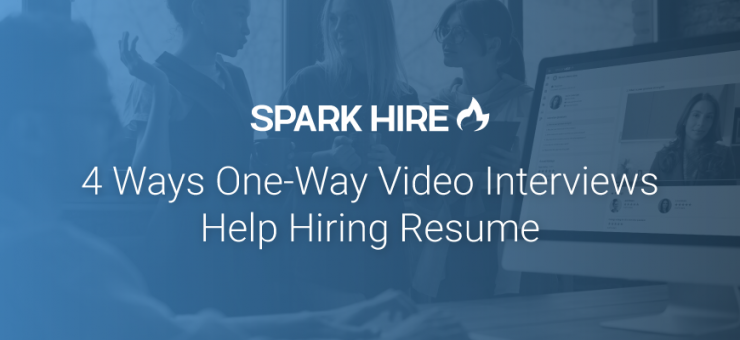What started as an optimistic year for hiring, with employers adding a whopping 225,000 jobs in January, quickly turned into employers’ worst nightmare. Hiring came to a sudden halt. Employees were let go. And businesses suffered.
COVID-19 has taken its toll on our physical health as well as the health of our businesses. But as states began to reopen, optimism returned. After months of shelter-in-place orders, social distancing, layoffs and furloughs, SHRM reported that the U.S. gained an impressive 2.5 million jobs in May.
While we still have a long way to go before our people, economy, and businesses fully recover, things are certainly starting to look up. And for many companies, that means resuming hiring.
With more employees working from home, the hiring process will undoubtedly look a little different. Whether you plan to recruit talent virtually or in person, there is one tool that can help speed up the process: one-way video interviews.
Here are just four ways one-way video interviews can make assessing job candidates easier as hiring resumes post-pandemic:
1. No need for phone interviews
As hiring picks up, the last thing anyone wants to do is spend upwards of 30 minutes on the phone with a single job candidate when sometimes you know in the first 3 minutes if they are a right fit for the job.
Fortunately, the very nature of one-way video interviews, in which candidates record themselves answering your pre-set interview questions, makes it so the traditional phone screen is no longer necessary. Instead, hiring professionals can review dozens of candidates without having to devote as much time to scheduling phone calls, interviewing candidates, and taking notes.
2. Predefined questions
One-way video interviews enable you to create a predefined list of interview questions to be answered in a certain amount of time. Sure, you can make a list of questions to ask every candidate over the phone or in person, but the back-and-forth nature of conversation makes it easier to stray from those questions.
What’s more, by determining a specific amount of time for each response, you encourage candidates to be clear and concise with their answers and make it easier to fairly evaluate candidates against each other.
When using one-way video interviews, it’s also smart to work with your team to determine screening evaluation criteria. This way, you can easily (and quickly) identify — and agree on — who should move on to the next stage of the interview process.
3. Less back-and-forth
Whether it’s trying to find a day and time that works for both the interviewer(s) and interviewee or casually conversing with candidates, the screening process typically involves a lot of back-and-forth.
This back-and-forth may not seem very time-consuming, but when you’re trying to get back on your feet after a global pandemic, the last thing you want to do is spend more time than necessary emailing candidates or discussing things that don’t pertain to the interview.
With one-way video interviews, candidates can record their responses and hiring teams can review them whenever works best for them.
4. Better collaboration
Traditionally, the screening process involved a phone interview with a member or two of the hiring team. Those members would be responsible for recalling information about the candidate and their responses and sharing it with the rest of the team.
With one-way video interviews, on the other hand, no member of the team has to be present. The candidate records their responses, and the hiring team reviews those responses at their convenience. This makes it easier to share and collaborate with team members, especially with so much of the workforce still working remotely.
COVID-19 affected businesses both big and small. But as we begin to emerge from this crisis and hiring picks up, it’s important to look for little ways to not only make the hiring process conducive to the new way we work but also to save time.
In today’s “new normal,” hiring professionals need to spend less time reviewing job candidates who may or may not be the right job or culture fit and more time advancing top talent and making long-lasting hires.












